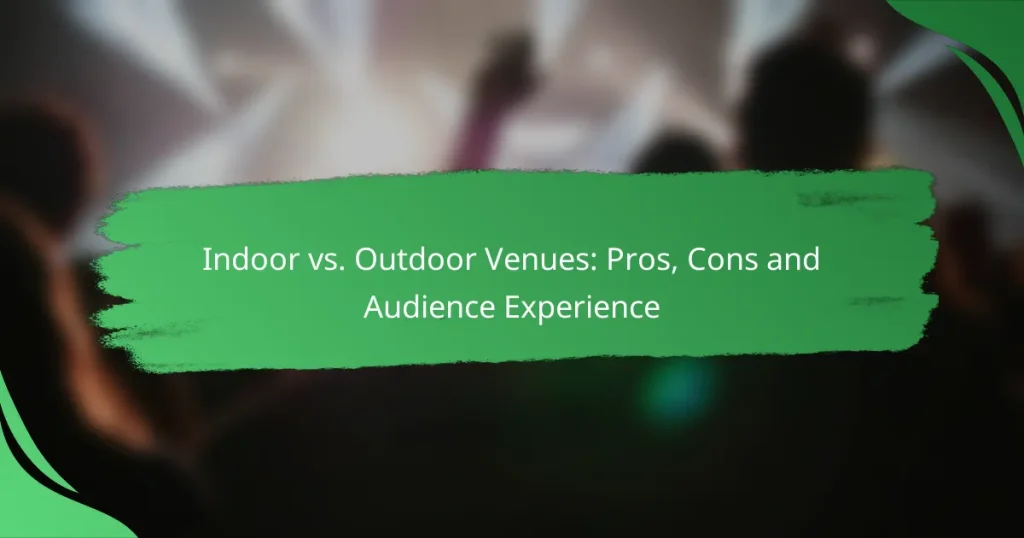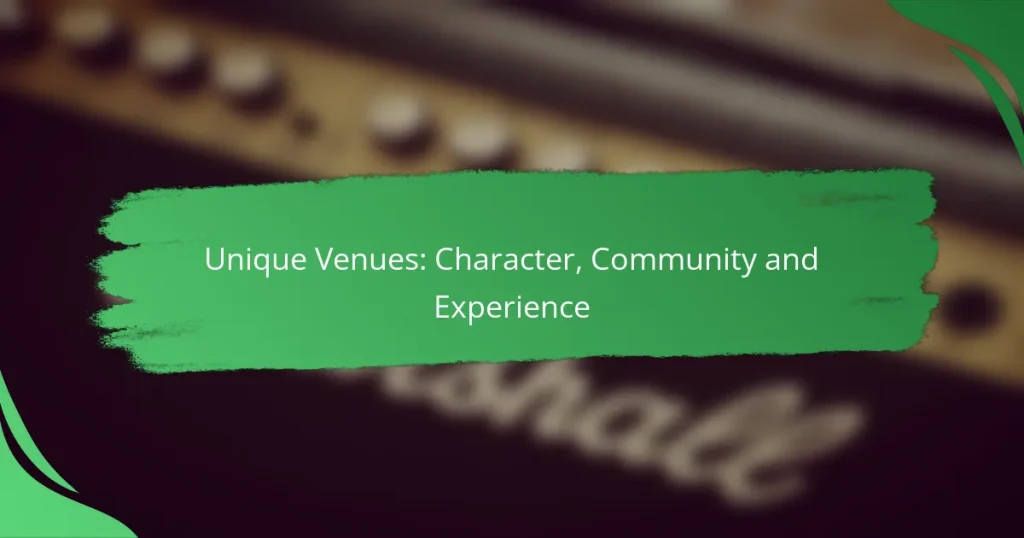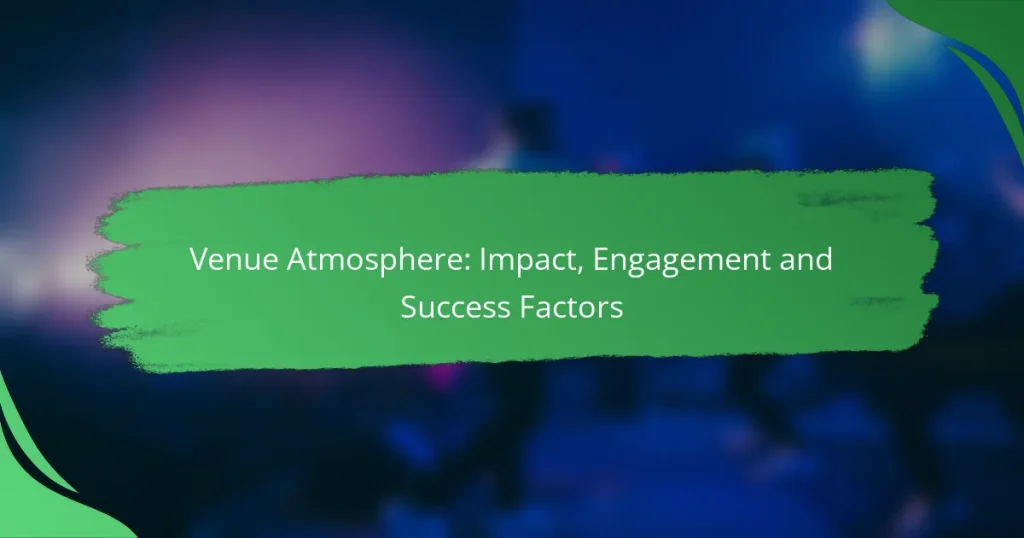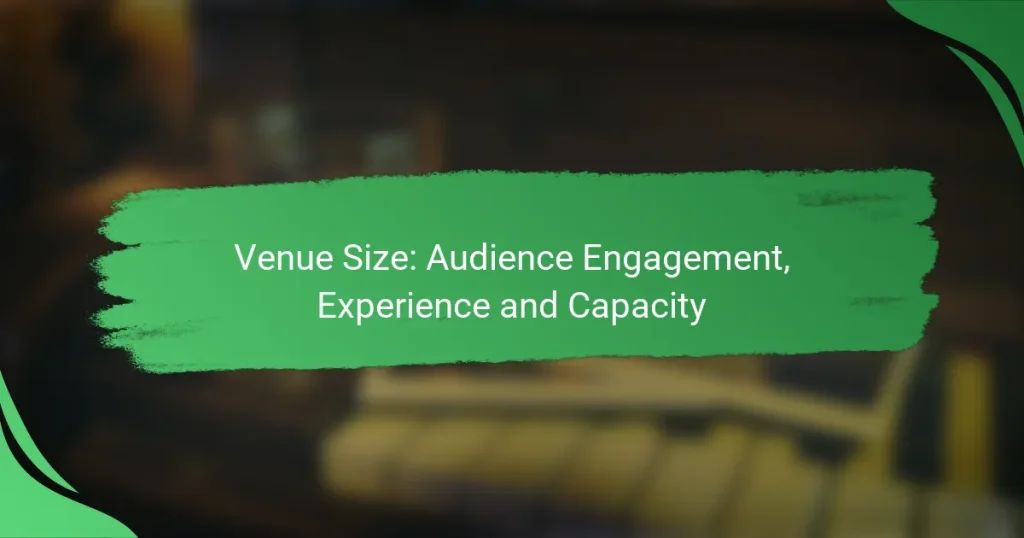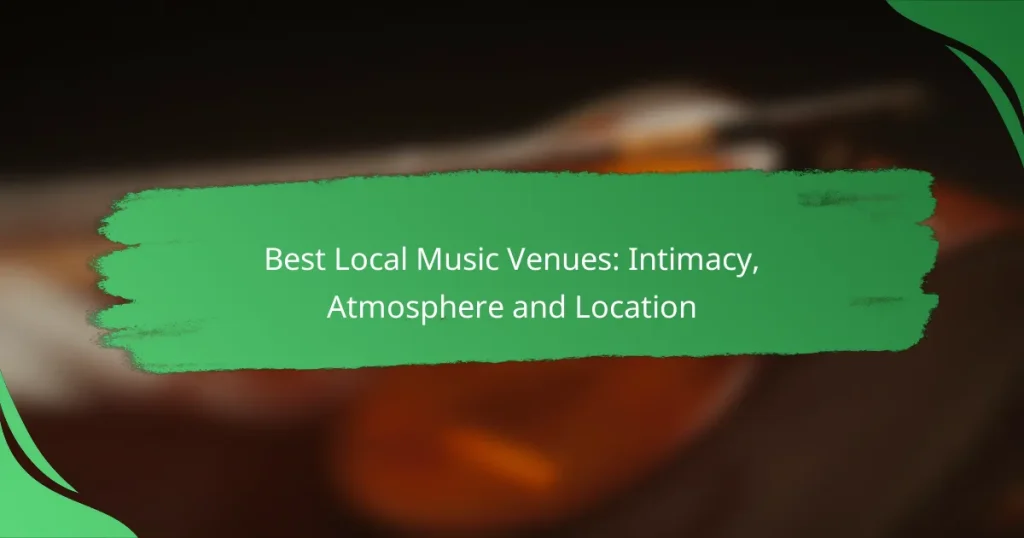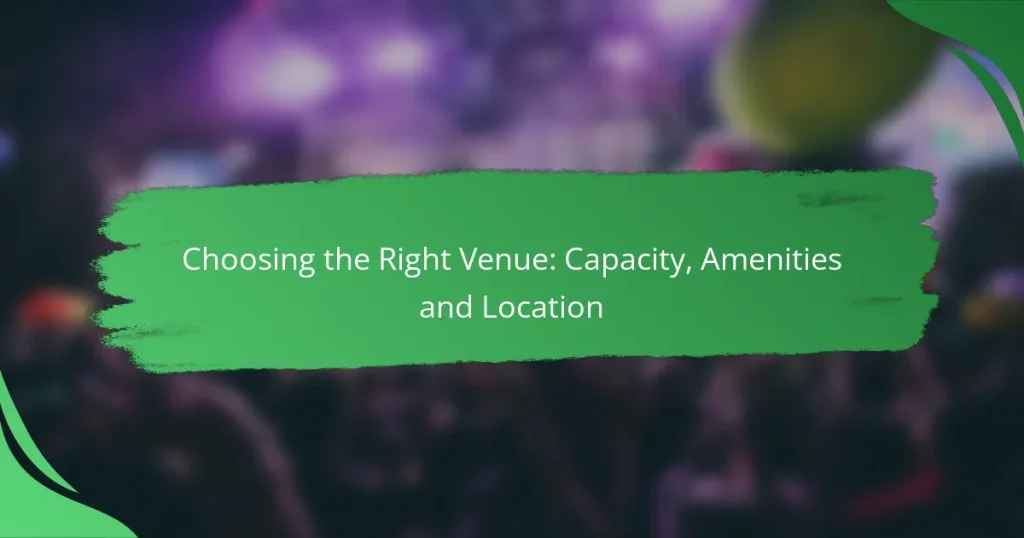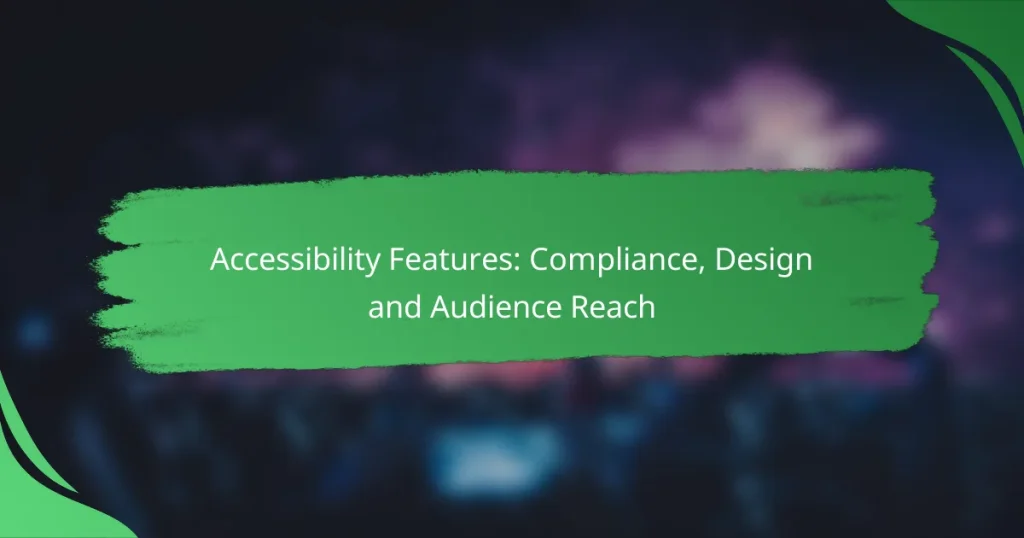Venue diversity plays a crucial role in enriching local music scenes by showcasing a wide array of musical styles and cultures. By promoting various genres through strategic collaborations and community initiatives, local venues can attract diverse audiences and foster cultural exchange, ultimately benefiting both artists and the community. Cities like New York, Los Angeles, and Nashville exemplify this diversity, offering a range of performance spaces that contribute to a vibrant musical landscape.
Unique Venues: Character, Community and Experience
Venue Atmosphere: Impact, Engagement and Success Factors
Venue Size: Audience Engagement, Experience and Capacity
Best Local Music Venues: Intimacy, Atmosphere and Location
Choosing the Right Venue: Capacity, Amenities and Location
Accessibility Features: Compliance, Design and Audience Reach
How can local venues enhance music diversity?
Local venues can enhance music diversity by actively promoting a variety of musical styles and cultures. This can be achieved through strategic collaborations, targeted events, and community-focused initiatives that attract a broad audience.
Collaboration with diverse artists
Collaborating with a range of artists from different backgrounds is essential for fostering music diversity. Venues can invite musicians from various genres, such as jazz, hip-hop, folk, and electronic, to perform, creating a rich tapestry of sounds. This not only broadens the musical offerings but also engages different community segments.
To facilitate these collaborations, venues might consider partnerships with local cultural organizations or music schools. These partnerships can help identify emerging artists and provide platforms for them to showcase their talents, ensuring a steady influx of fresh and diverse musical acts.
Hosting genre-specific events
Hosting genre-specific events allows venues to cater to niche audiences while promoting musical diversity. For instance, a venue could organize a monthly reggae night or a bi-weekly open mic for spoken word and hip-hop artists. These focused events can attract dedicated fans and encourage participation from artists who may not typically perform in mainstream settings.
It’s beneficial for venues to schedule these events at different times to maximize attendance. For example, a weekend evening might be ideal for a larger concert, while a weekday afternoon could work well for a smaller, more intimate gathering.
Community engagement initiatives
Community engagement initiatives play a crucial role in enhancing music diversity at local venues. By hosting workshops, music education programs, or community festivals, venues can involve local residents and foster a sense of ownership over the music scene. These initiatives can also highlight underrepresented musical traditions and encourage participation from diverse groups.
Venues should actively promote these initiatives through social media and local partnerships to reach a broader audience. Offering free or low-cost entry to community events can further encourage attendance and participation, making music more accessible to everyone.
What are the benefits of diverse music venues?
Diverse music venues provide numerous advantages, including attracting a broader audience, fostering cultural exchange, and boosting local economies. These benefits create a vibrant music scene that supports artists and engages communities.
Attracting wider audiences
Diverse music venues appeal to various demographics, drawing in larger crowds. By hosting different genres and styles, venues can cater to the tastes of multiple communities, increasing attendance and participation.
For example, a venue that features everything from jazz to hip-hop can attract fans from different backgrounds, enhancing the overall experience. This variety not only enriches the audience but also encourages repeat visits.
Fostering cultural exchange
Music venues that showcase diverse genres promote cultural exchange among artists and audiences. By bringing together different musical traditions, these venues create opportunities for collaboration and understanding.
Events that feature international artists or local musicians from various cultural backgrounds can introduce audiences to new sounds and perspectives. This exchange cultivates appreciation and respect for different cultures, enriching the community as a whole.
Boosting local economies
Diverse music venues can significantly contribute to local economies by attracting visitors and stimulating spending. Increased foot traffic from concerts and events benefits nearby businesses, such as restaurants and shops.
Moreover, hosting music festivals or regular performances can create job opportunities, from event staff to local vendors. The economic impact can be substantial, often leading to a thriving arts scene that supports both artists and the community.
Which cities are leading in venue diversity?
New York City, Los Angeles, and Nashville are at the forefront of venue diversity, each offering a unique blend of spaces that cater to various music genres and audiences. These cities provide a rich tapestry of performance locations, from intimate clubs to large arenas, fostering a vibrant local music scene.
New York City
New York City boasts an extensive range of music venues, from iconic spots like the Apollo Theater to smaller, underground clubs in neighborhoods like the Lower East Side. This diversity allows artists to perform in settings that match their style, whether they are indie bands or jazz ensembles.
Consider the variety of genres represented: rock, hip-hop, classical, and electronic music all find homes in different venues across the city. This broad spectrum not only attracts a diverse audience but also encourages collaboration among artists from various backgrounds.
Los Angeles
Los Angeles is known for its dynamic music scene, with venues ranging from the historic Hollywood Bowl to smaller bars in Silver Lake. The city’s emphasis on entertainment means that venues often cater to a wide array of musical tastes, including pop, rock, and electronic music.
Many venues in Los Angeles also serve as launching pads for emerging artists, providing opportunities for local talent to gain exposure. The city’s vibrant nightlife further enhances the experience, drawing in crowds eager to discover new music.
Nashville
Nashville, often dubbed “Music City,” is renowned for its country music venues, but its diversity extends beyond that genre. From the Grand Ole Opry to smaller honky-tonks on Broadway, the city offers a variety of performance spaces that showcase everything from rock to blues.
The local music scene is supported by a strong community of musicians and fans, making it a hub for collaboration and innovation. Venues often host open mic nights and showcases, giving aspiring artists a chance to perform and connect with audiences.
What criteria should be used to select diverse venues?
To select diverse venues for local music, consider factors such as accessibility, the range of music genres offered, and the venue’s ability to attract a varied audience. These criteria ensure that the music scene is inclusive and representative of different communities.
Accessibility for all audiences
Accessibility is crucial for ensuring that all audiences can enjoy live music. Venues should comply with local regulations regarding physical accessibility, including wheelchair ramps, accessible restrooms, and seating options. Additionally, consider auditory and visual accommodations, such as assistive listening devices and sign language interpreters.
It’s also important to evaluate the location of the venue. Public transport options, parking availability, and safety of the surrounding area can significantly impact audience attendance. Venues situated in well-connected areas tend to attract a more diverse crowd.
Variety of music genres offered
Offering a variety of music genres is essential for appealing to a broad audience. Venues should aim to host different styles, from rock and jazz to hip-hop and folk, to cater to diverse musical tastes. This variety not only enriches the local music scene but also encourages cross-genre collaboration among artists.
When planning events, consider scheduling themed nights or festivals that highlight specific genres or cultural music. This approach can draw in niche audiences while also introducing them to other styles, fostering a more inclusive atmosphere.
How do local regulations impact venue diversity?
Local regulations significantly influence venue diversity by establishing the framework within which music venues operate. These regulations can dictate the types of events that can be held, the locations where venues can be established, and the overall accessibility of these spaces for various music genres.
Licensing requirements
Licensing requirements are crucial for venue diversity as they determine what types of performances can occur legally. Venues often need specific licenses for live music, alcohol sales, and food service, which can vary by city or state. For example, a venue in New York may require a cabaret license to host live music, while a venue in Texas might only need a basic alcohol permit.
Venues should carefully review local licensing laws to avoid fines or shutdowns. Engaging with local authorities early in the planning process can help identify necessary licenses and streamline the application process.
Zoning laws
Zoning laws dictate where music venues can be located, which directly impacts venue diversity. These laws can restrict venues to certain areas, often favoring commercial districts over residential neighborhoods. For instance, a venue in a mixed-use zone may have more flexibility in hosting diverse events compared to one in a strictly residential area.
Understanding zoning regulations is essential for venue operators. They should check local zoning maps and consult with city planners to explore potential locations and any restrictions that may apply, ensuring they can cater to a wide range of musical styles and audiences.
What are the challenges faced by diverse music venues?
Diverse music venues often encounter significant challenges that can hinder their growth and sustainability. These obstacles include securing adequate funding, competing with mainstream venues, and navigating community support dynamics.
Funding and sponsorship issues
Funding is a critical challenge for diverse music venues, as they typically rely on a mix of ticket sales, grants, and sponsorships. Many smaller venues struggle to attract corporate sponsors due to limited visibility and perceived risk, which can lead to financial instability.
To mitigate funding issues, venues can explore partnerships with local businesses and community organizations. Engaging in crowdfunding campaigns or applying for arts grants can also provide necessary financial support, helping to diversify income sources.
Competition with mainstream venues
Diverse music venues face stiff competition from larger, mainstream venues that often have more resources and established audiences. This competition can make it difficult for smaller venues to attract top talent and draw in crowds, impacting their overall viability.
To stand out, diverse venues should focus on unique programming that highlights local artists and niche genres. Creating a strong community identity and fostering loyal patron relationships can also help build a dedicated audience that values diversity in music offerings.
How can technology support venue diversity?
Technology can enhance venue diversity by providing tools that connect artists with a wider range of performance spaces. Online platforms and social media enable musicians to discover and book venues that may not be traditionally accessible, fostering a more inclusive music scene.
Online booking platforms
Online booking platforms streamline the process of finding and reserving diverse venues for performances. These platforms often allow artists to filter options based on location, capacity, and amenities, making it easier to find suitable spaces that fit their needs.
For example, platforms like Eventbrite or GigSalad can help musicians locate unique venues such as art galleries, community centers, or even private homes. This flexibility can lead to more varied and engaging live music experiences.
Social media marketing
Social media marketing plays a crucial role in promoting diverse venues and events. Musicians can leverage platforms like Instagram and Facebook to showcase their performances at unconventional locations, attracting audiences who may be interested in exploring new music scenes.
Engaging content, such as behind-the-scenes videos or live-streamed performances, can create buzz and encourage attendance. Artists should consider using targeted ads to reach specific demographics, ensuring their events are seen by the right audience.
